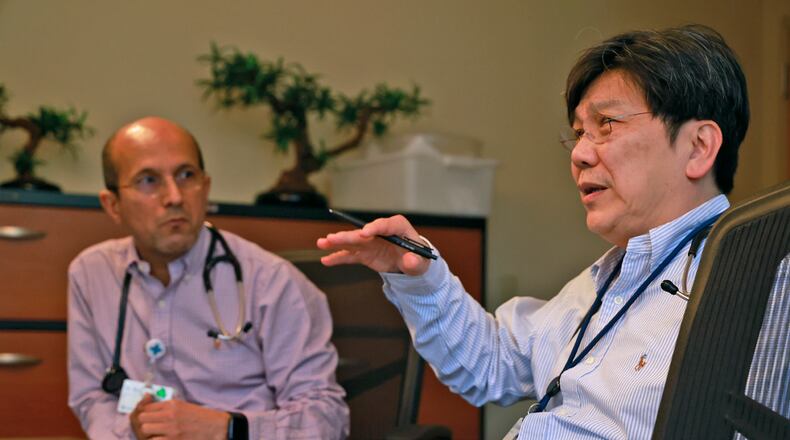Since 2021, Mercy Health has doubled its number of lung cancer screenings and has increased its number of cases caught early, nurse and lung cancer coordinator Angela Wagner said.
The hospital received a grant from Gala of Hope this year that will help the hospital focus more on community education, which is a challenge, Wagner said.
“People don’t want to know if they have cancer or they feel embarrassed like ‘I am a smoker; I deserve to get cancer because I knew it was a risk,’ and that’s just not the case,” Wagner said. “Our big thing is no one deserves cancer, and we want to try to break down that stigma.”
Part of breaking down the stigma is better educating the community about lung cancer, Wagner said. This includes community events like Thursday’s Shine a Light on Lung Cancer.
The hospital will open a smaller cancer center in Urbana at the beginning of next year, which will expand access to cancer treatment for patients, Wagner said.
Dr. Filix Kencana, an oncologist at the hospital, said that lung cancer treatment options have changed a lot over the last several years, with later stages becoming more treatable than previously. But early diagnosis is the best option for a positive outcome.
Cancer treatment has also become a lot more tailored to the specific cancer and the patient, Dr. Zaw Bo, an oncologist at the hospital, said.
Screening guidelines changed in 2021, with the American Cancer Society recommending high-risk patients and those aged 50-80 and people who have smoked for 20 or more years undergo screenings, Kencana said. He said in the future, he expects the minimum age to decrease as more studies are conducted.
An early symptom of lung cancer may be excessive coughing, but Wagner said that longtime smokers may dismiss this as something typical for them. It is very common to have lung cancer without symptoms.
A large percentage of people with lung cancer are or were smokers, but genetics and things like radon exposure can also cause the cancer, Kencana said. He said it’s tricky to categorize secondhand smokers as high risk, because it can be hard to determine how much smoke exposure they had, but this can have an impact on their risk for lung or other cancers.
Screenings are not a replacement for quitting smoking, Kencana said.
Once a person stops smoking after an extended period of time, their cancer risk will remain high, but their risk for cardiovascular events like heart attacks or strokes drops dramatically, Kencana said.
Kencana said lung cancer screenings include a CT scan, and if something is found, a biopsy may be done to determine if a polyp is cancerous. A person may have to come back in three months or so if the CT scan is indicative of cancer but the biopsy is negative.
Mercy Health will soon have another lung cancer navigator to help shorten the timeline between screenings and treatment, Wagner said.
There are two main types of lung cancer, with small-cell always being caused by smoking and non-small-cell being caused by smoking or other factors, Bo said. Small-cell spreads rapidly and has a much lower survival rate, so it’s crucial that it is caught early.
There is a trend of people beginning to smoke or vape earlier, especially with flavored vapes being more targeted toward kids, Wagner said. Mercy Health – Springfield’s Mercy REACH program provides outpatient drug, tobacco and alcohol treatment program services.
About the Author

